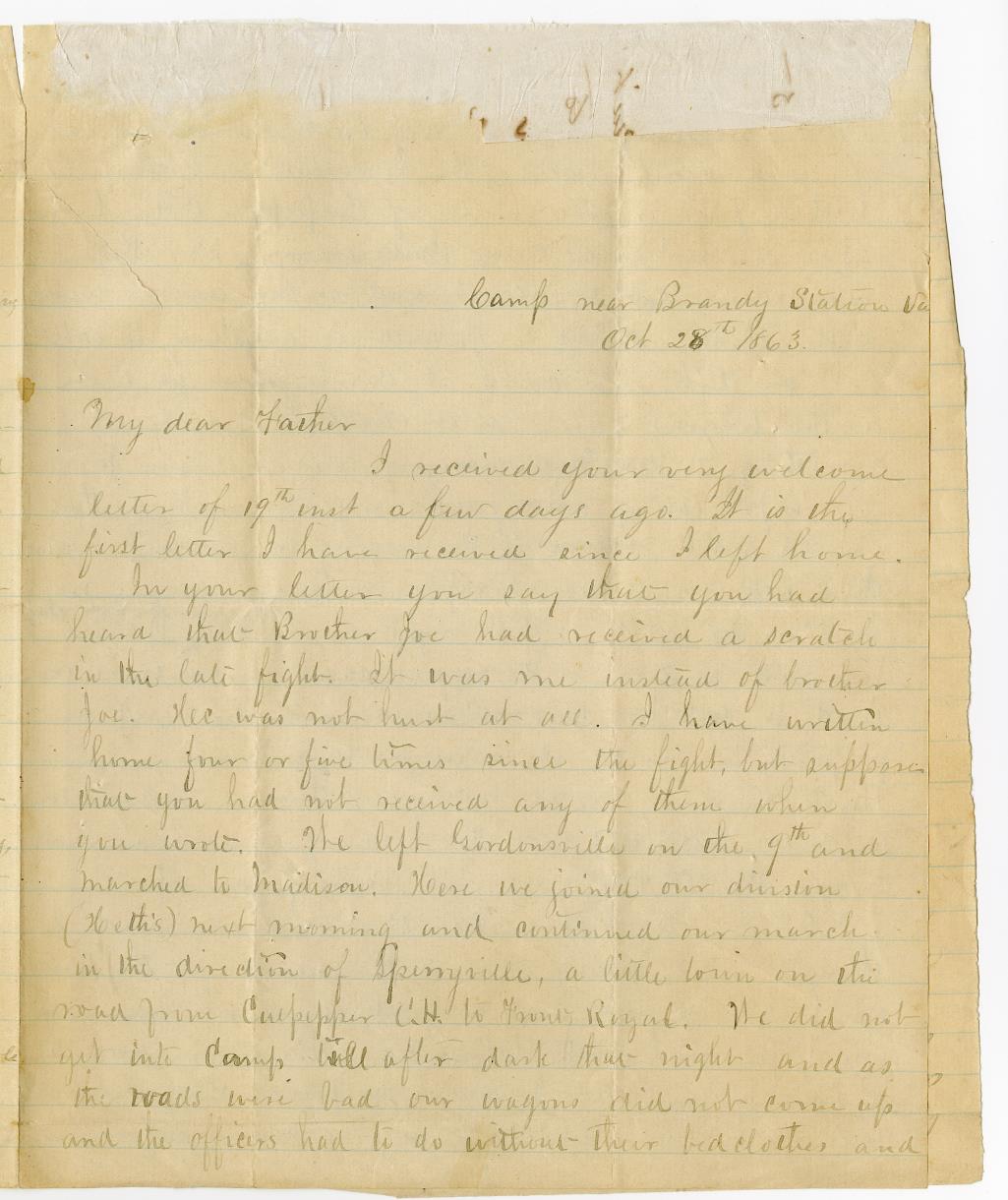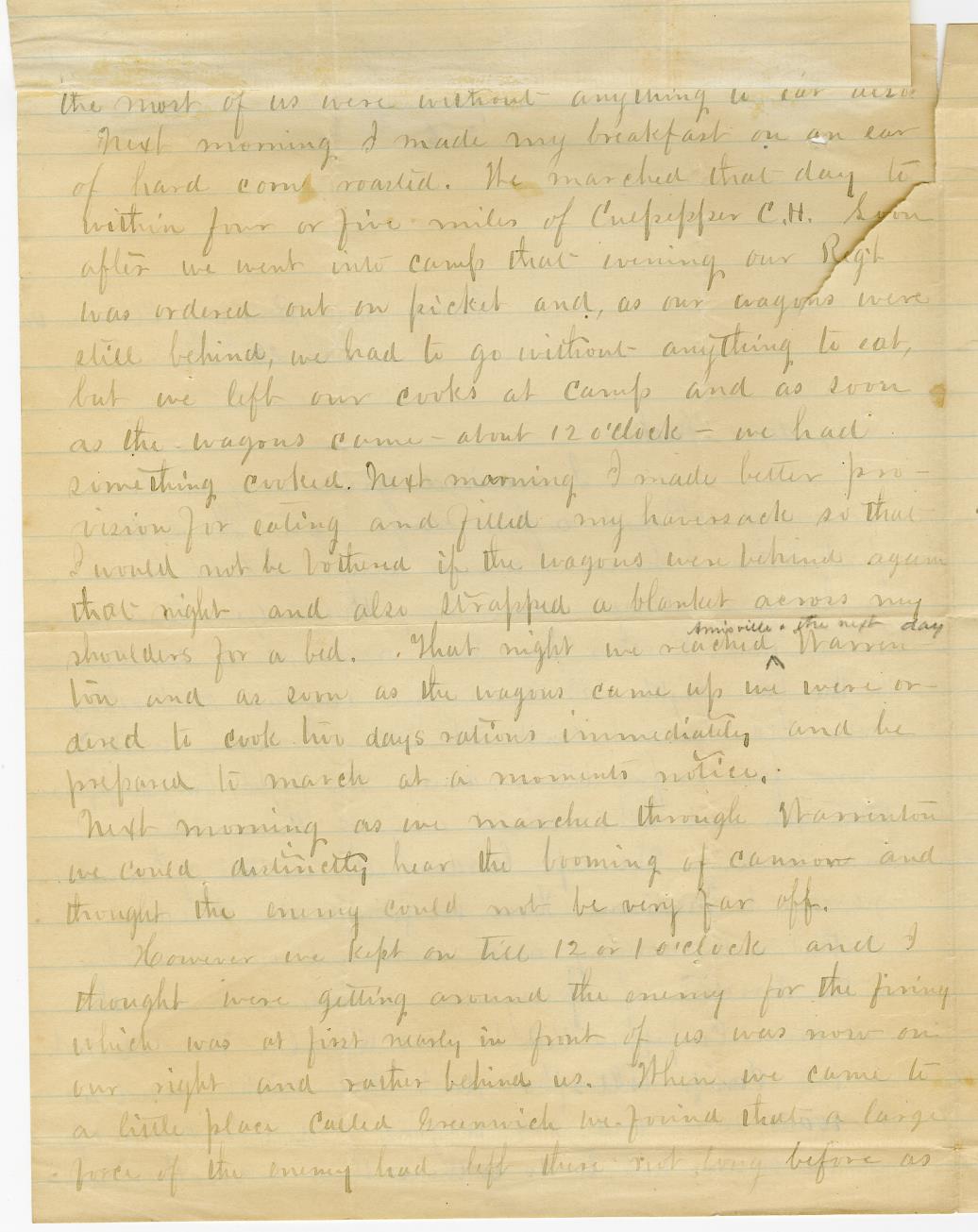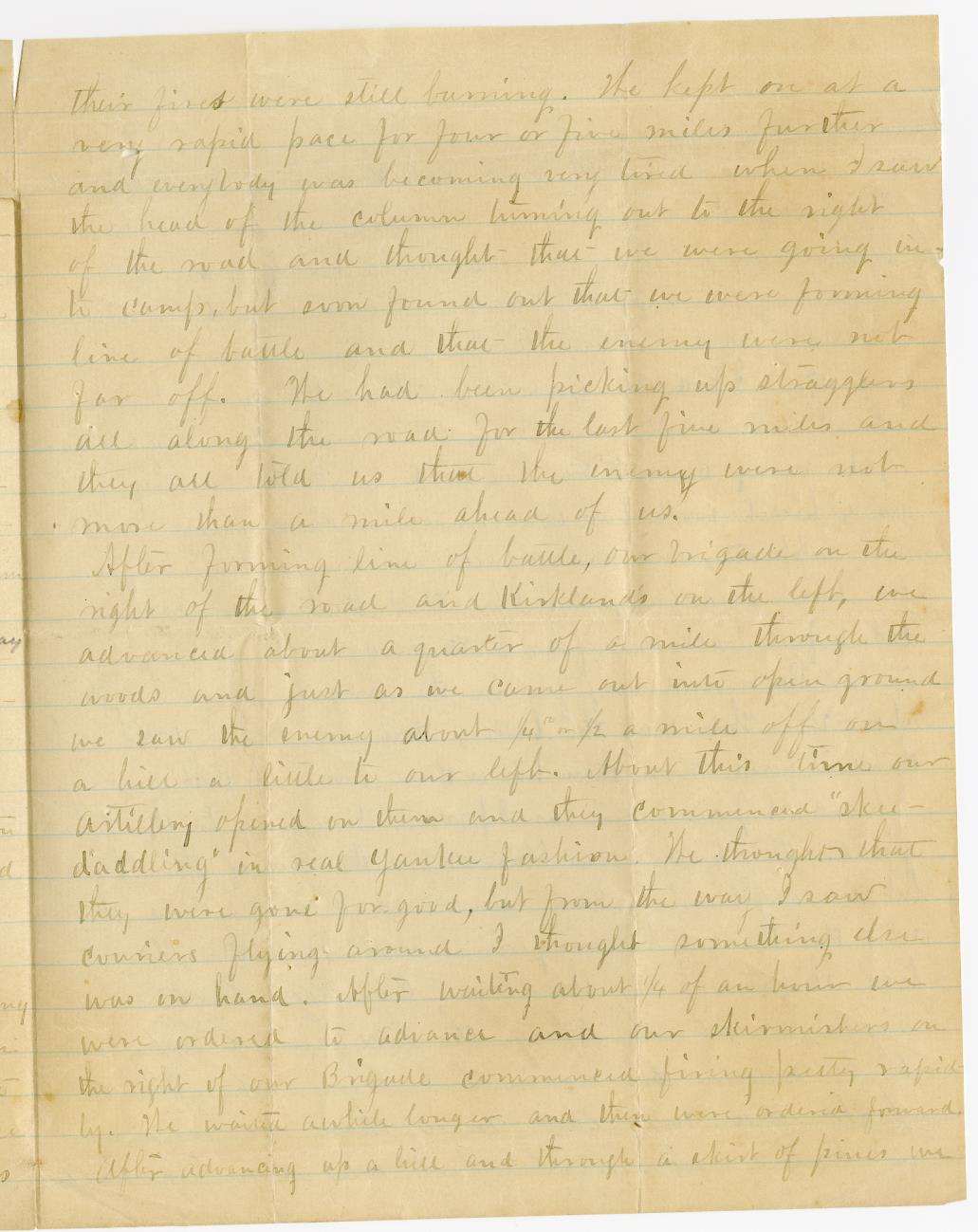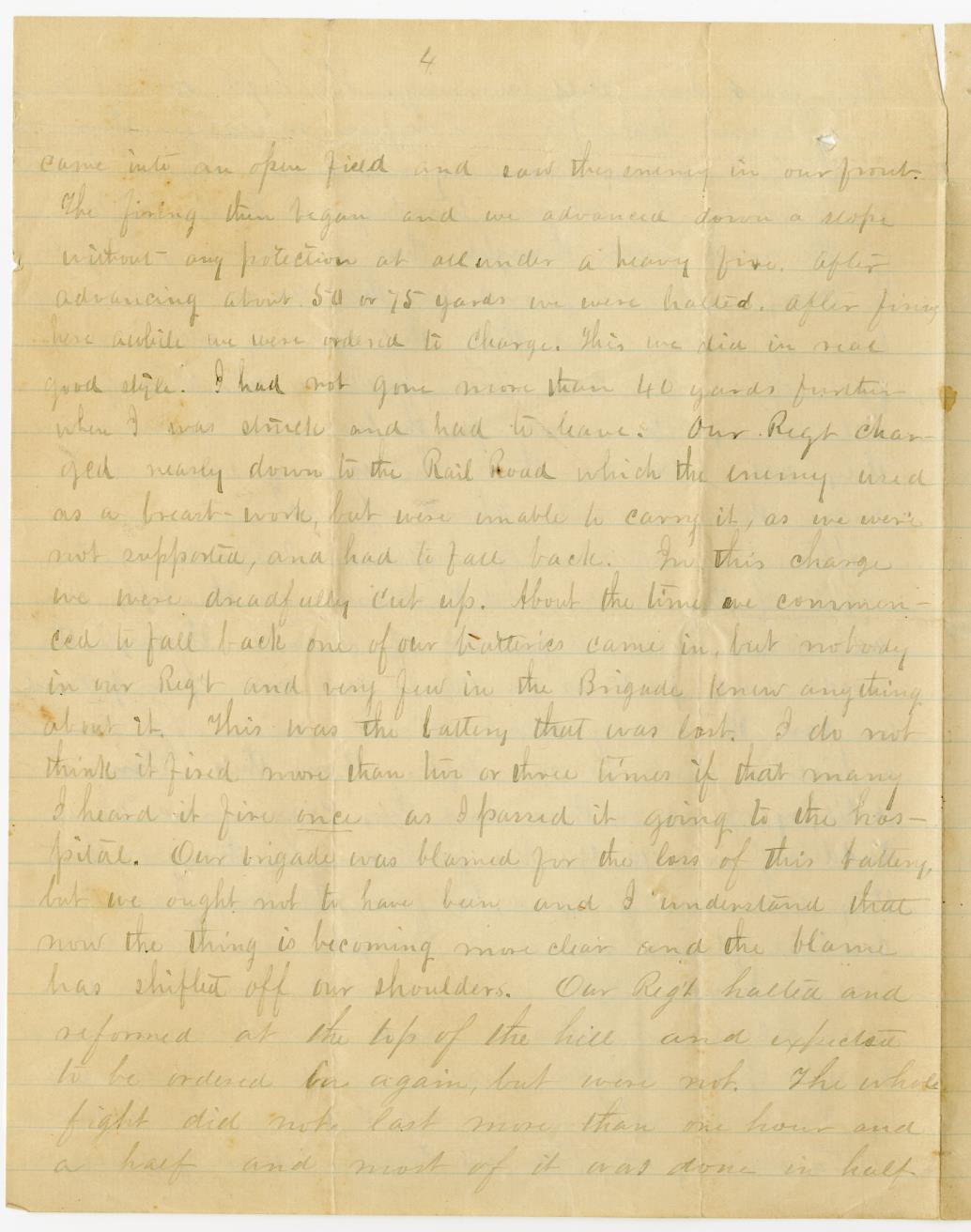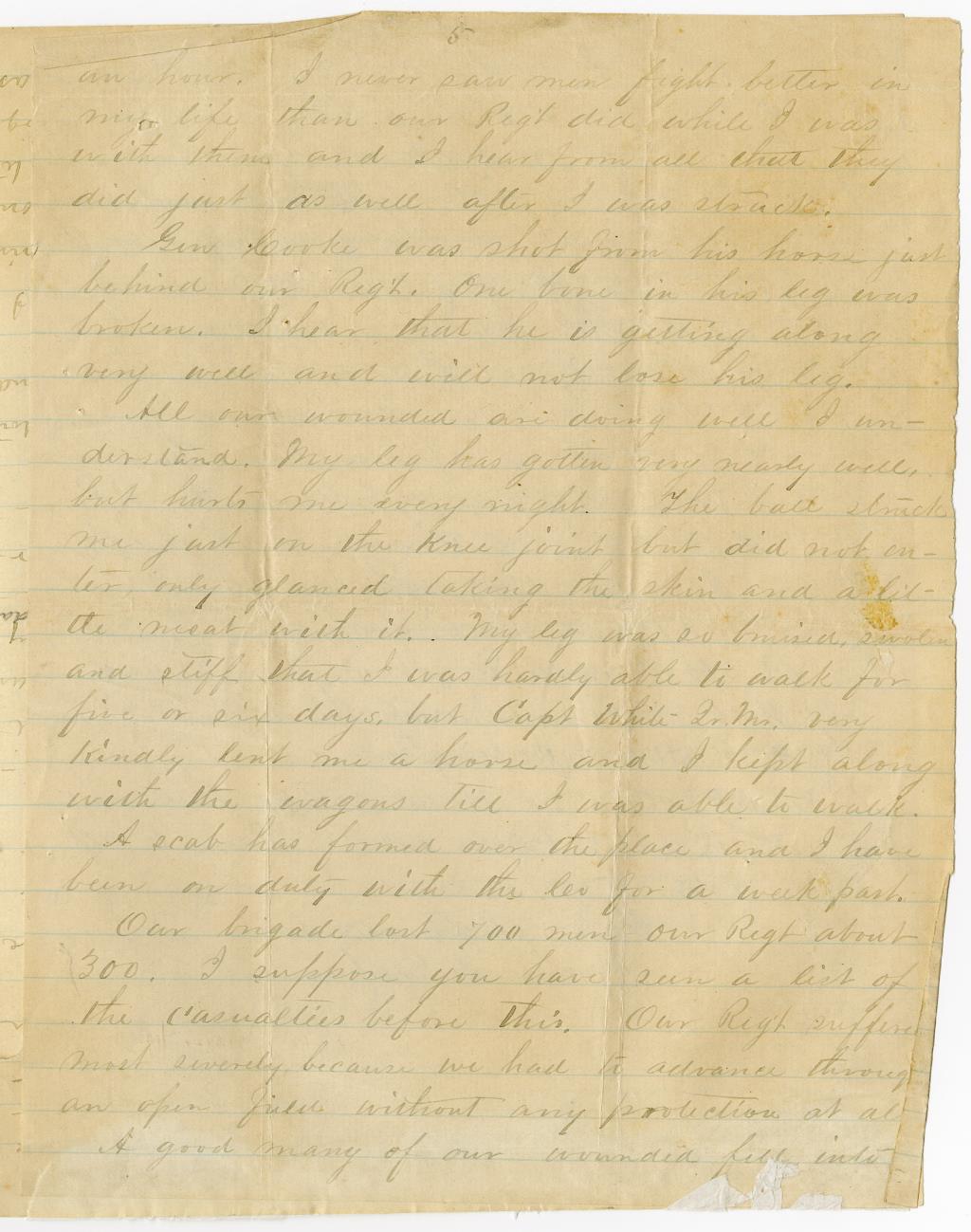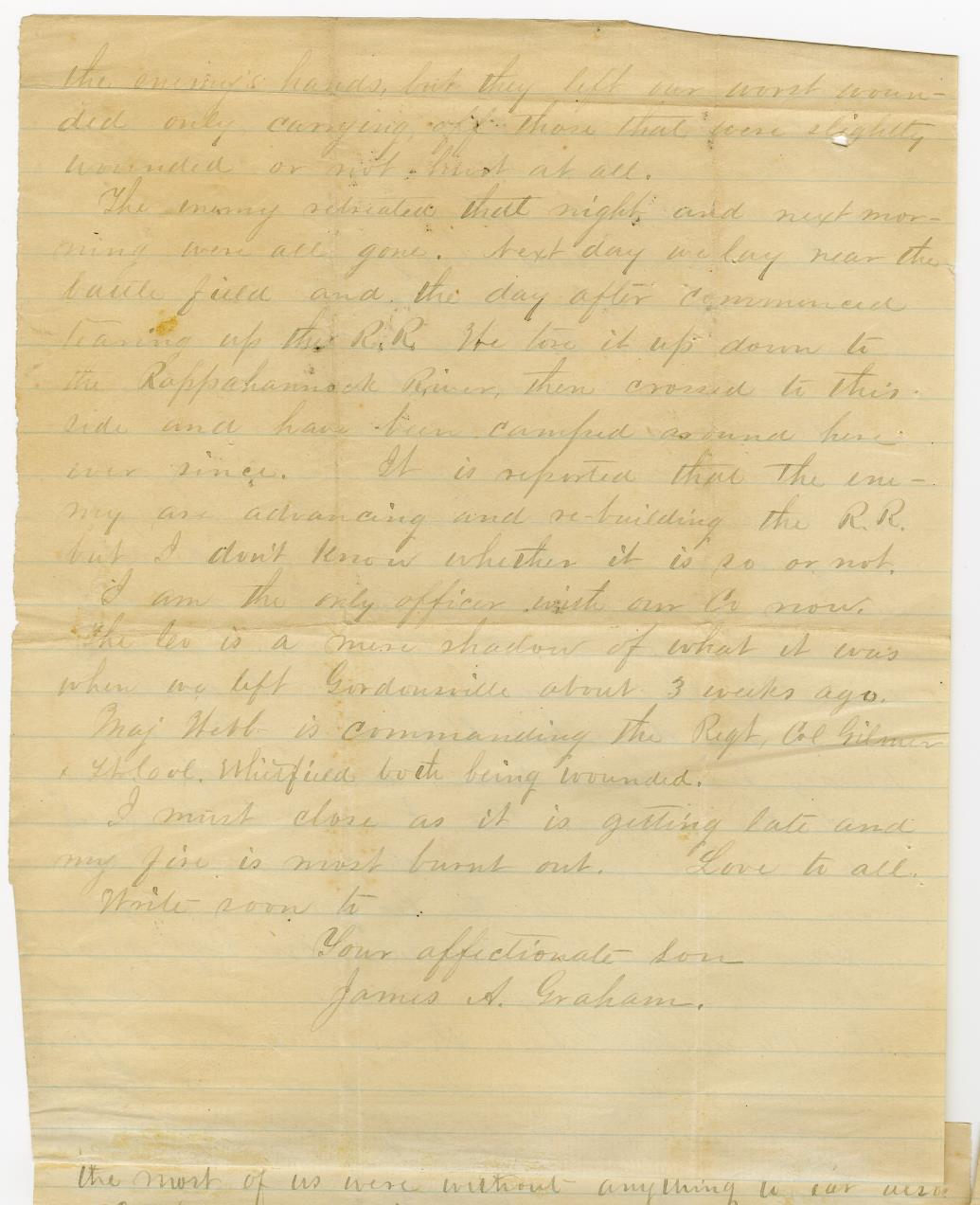Item description: In this letter, 28 October 1863, James Augustus Graham, an officer in Company G (Orange Guards), 27th North Carolina Infantry Regiment, wrote again to his parents about the recent Battle of Bristoe Station. He provided a detailed description of the wound to his knee and his regiment’s role in the battle and its movements afterward.
Item citation: in folder 2 in the James Augustus Graham Papers #283, Southern Historical Collection, Wilson Library, University of North Carolina at Chapel Hill.
Item transcription:
Camp near Brandy Station Va
Oct 28th 1863
My dear Father
I received your very welcome letter of the 19th inst a few days ago. It is the first letter I have received since I left home.
In your letter you say that you had heard that Brother Joe had received a scratch in the late fight. It was me instead of brother Joe. He was not hurt at all. I have written home four or five times since the fight, but suppose that you had not received any of them when you wrote. We left Gordonsville on the 9th and marched to Madison. Here we joined our division (Heth’s) next morning and continued our march in the direction of Sperryville, a little town on the road from Culpepper C.H. to Front Royal. We did not get into camp till near dark that night and as the roads were bad our wagons did not come up and the officers had to do without their bed clothes and the most of us were without anything to eat also
next morning I made my breakfast on an ear of hard corn roasted. We marched that day to within four or five miles of Culpepper C.H. Soon after we went into camp that evening our Reg’t was ordered out on picket and as our wagons were still behind, we had to go without anything to eat, but we left our cooks at camp and as soon as the wagons came – about 12 o’clock – we had something cooked. Next morning I made better provision for eating and filled my haversack so that I would not be bothered if the wagons were behind again that night and also strapped a blanket across my shoulders for a bed. That night we reached Amissville & the next day Warrenton and as soon as the wagons came up we were ordered to cook two days rations immediately and be prepared to march at a moments notice.
Next morning as we marched through Warrenton we could distinctly hear the booming of cannon and thought the enemy could not be very far off.
However we kept on till 12 or 1 o’clock and I thought were getting around the enemy for the firing which was at first nearly in front of us now was now on our right and rather behind us. When we came to a little place called Greenwich we found that a large force of the enemy had left there not long before as their fires were still burning. We kept on at a very rapid pace for four or five miles further and everybody was becoming very tired when I saw the head of the column turning out to the right on the road and thought that we were going into camp, but soon found out that we were forming line of battle and that the enemy were not far off. We had been picking up stragglers all along the road for the last five miles and they all told us that the enemy were not more than a mile ahead of us.
After forming line of battle, our brigade on the right of the road and Kirkland’s on the left, we advanced about a quarter of a mile through the woods and just as we came out into open ground we saw the enemy about 1/4 or 1/2 a mile off on a hill a little to our left. About this time our artillery opened on them and they commenced “skeedaddling” in real Yankee fashion. We thought that they were gone for good, but from the way I saw couriers flying around I thought something else was on hand.
After waiting about 1/4 of an hour we were ordered to advance and our skirmishers on the right of our Brigade commenced firing pretty rapidly. We waited a while longer and then were ordered forward. After advancing up a hill and through a skirt of pines we came into an open field and saw the enemy in our front. The firing then began and we advanced down a slope without any protection at all under heavy fire. After advancing about 50 or 75 yards we were halted. After firing here awhile we were ordered to charge. This we did in real good style. I had not gone more than 40 yards further when I was struck and had to leave. Our Regt charged nearly down to the Rail Road which the enemy used as a breast-work, but were unable to carry it, as we were not supported, and had to fall back. In this charge we were dreadfully out up. About the time we commenced to fall back one of our batteries came in, but nobody in our Reg’t and very few in the Brigade knew anything about it. This was the battery that was lost. I do not think it fired more than two or three times if that many I heard it fire once as I passed it going to the hospital. Our brigade was blamed for the loss of this battery, but we ought not to have been and I understand that now the thing is becoming more clear and the blame is shifted off our shoulders. Our Reg’t halted and reformed at the top of the hill and expected to be ordered in again, but were not. The whole fight did not last more than one hour and a half and most of it was done in half an hour. I never saw men fight better in my life than our Reg’t did while I was with them and I hear from all that they did just as well after I was struck.
Gen Cooke was shot from his horse just behind our Reg’t. One bone in his leg was broken. I hear that he was getting along very well and will not lose his leg.
All our wounded are doing well I understand. My leg has gotten very nearly well, but hurts me every night. The ball struck me just on the knee joint but did not enter, only glanced taking the skin and a little meat with it. My leg was so bruised, swolen and stiff that I was hardly able to walk for five or six days, but Capt White Qr.Mr. very kindly lent me a horse and I kept along with the wagons till I was able to walk. A scab has formed over the place and I have been on duty with the Co for the week past.
Our brigade lost 700 men our Regt about 300. I suppose you have seen a list of the casualties before this. Our Reg’t suffered most severely because we had to advance through an open field without any protection at all.
A good many of our wounded fell into the enemy’s hands, but they left our worst wounded only carrying off those that were slightly wounded or not hurt at all.
The enemy retreated that night and next morning were all gone. Next day we lay near the battle field and the day after commenced tearing up the R.R. We tore it up down to the Rappahannock River, then crossed to this side and have been camped around here ever since. It is reported that the enemy are advancing and re-building the R.R. but I don’t know whether it is so or not.
I am the only officer with our Co now. The Co is a mere shadow of what it was when we left Gordonsville about 3 weeks ago.
Maj Webb is commanding the Regt, Col Gilmer and Lt Col. Whitfield both being wounded.
I must close as it is getting late and my fire is most burnt out. Love to all.
write soon to
Your affectionate Son
James A. Graham

